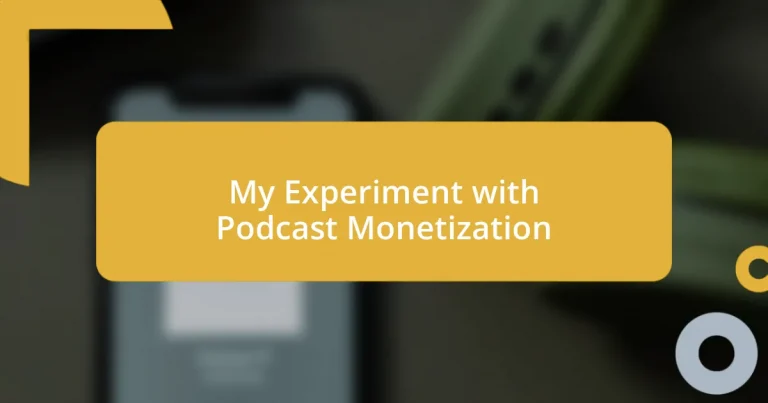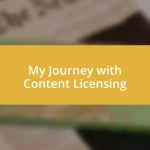Key takeaways:
- Understanding your audience is crucial for effective podcast monetization and helps create meaningful connections.
- Diversifying income streams through sponsorships, merchandise, and listener donations provides financial stability and community engagement.
- Transparency with audiences builds trust, while high-quality content attracts more listeners and sponsors.
- Measuring success should focus on engagement and impact rather than just download numbers; audience feedback is invaluable.
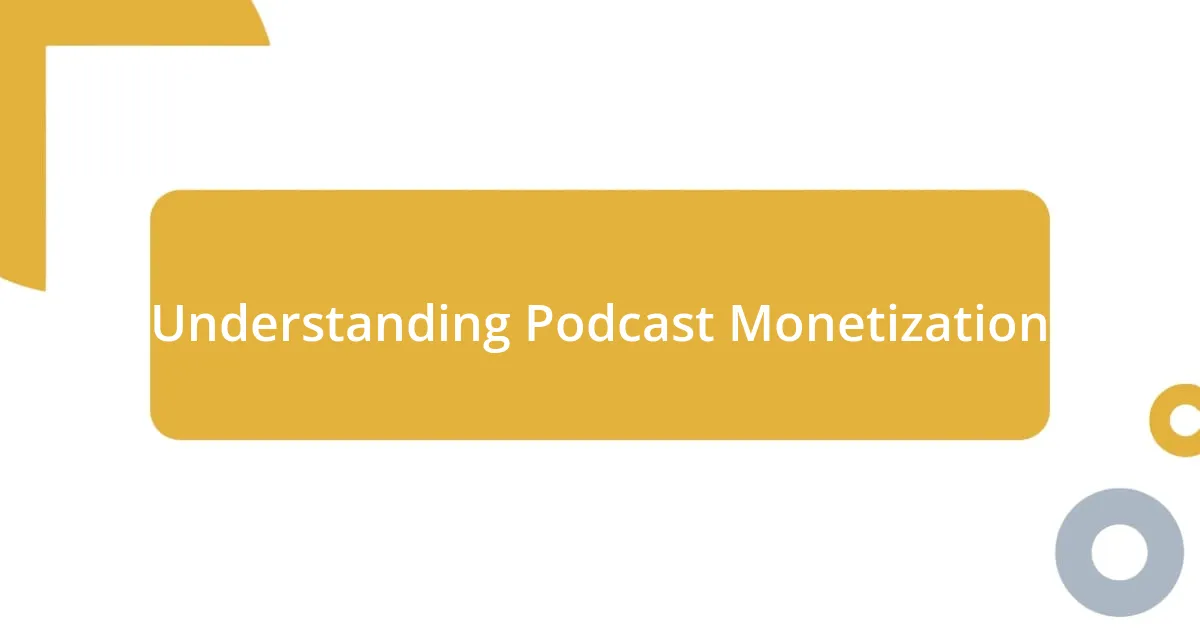
Understanding Podcast Monetization
Monetizing a podcast can feel like a maze, especially when you’re passionate about your content but unsure how to turn that passion into profit. I remember contemplating all the different avenues—advertising, sponsorships, and listener donations—while feeling a mix of excitement and anxiety. How do you choose the right path without compromising your creative integrity?
As I delved deeper into the world of podcast monetization, I realized that knowing your audience is paramount. I once launched a campaign that was perfectly crafted but didn’t resonate with my listeners, which ultimately fell flat. It struck me that understanding what my audience values not only informs my monetization strategies but also enriches the connection I share with them.
Then there’s the aspect of diverse income streams. I’ve found that relying solely on sponsorships isn’t the best approach, as it can lead to financial instability. By combining affiliate marketing with merchandise sales and Patreon support, I not only secured a reliable income but also created a community feeling. Have you considered how your podcast could thrive by tapping into multiple revenue channels?
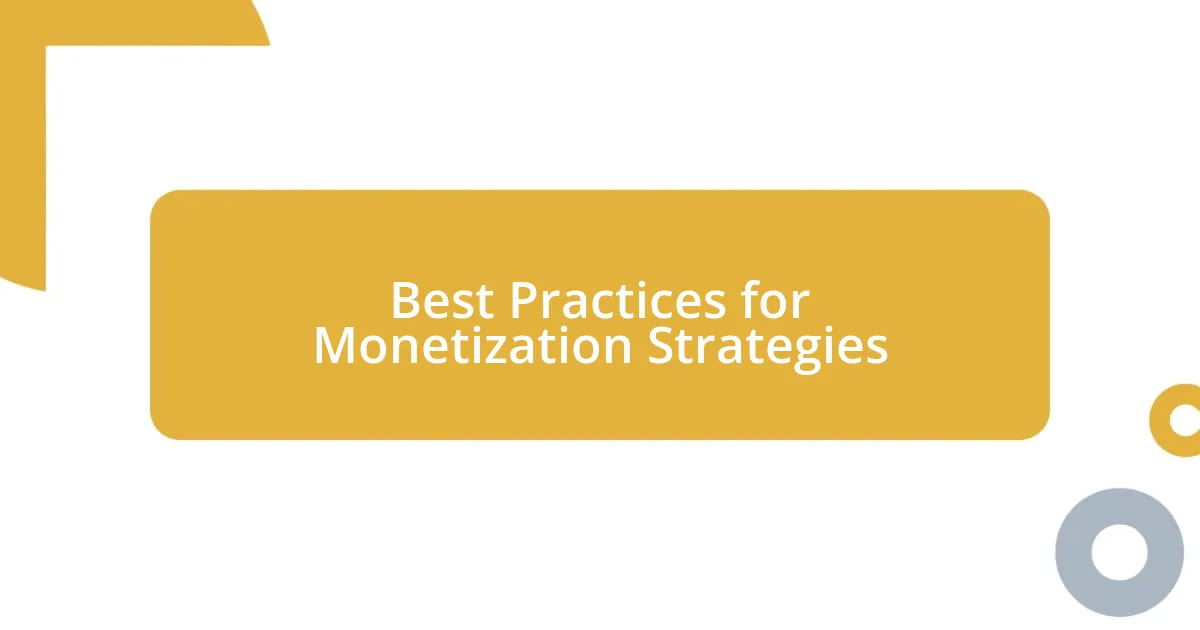
Best Practices for Monetization Strategies
The key to successful podcast monetization lies in transparency with your audience. When I started sharing sponsored content, I made sure to communicate openly about partnerships. This honesty built trust and encouraged my listeners to support the businesses I was promoting. Have you considered how your audience might appreciate knowing the behind-the-scenes workings of your monetization strategies?
Another vital practice is to consistently analyze performance metrics. After implementing different monetization methods, I took the time to review listener engagement and conversion rates. This data revealed trends that helped me refine my approach, allowing me to focus on what truly resonated with my audience. Regularly assessing your strategies can guide you toward better financial outcomes.
Lastly, creating high-quality content remains paramount. I remember a time when I put monetization ahead of the creative process, and my podcast quality suffered. The drop in listenership was a wake-up call. When your content shines, it naturally attracts sponsors and excited listeners willing to engage with your monetization efforts. Ask yourself, is your creative essence at the forefront of your podcast monetization approach?
| Monetization Method | Best Practice |
|---|---|
| Sponsorships | Be transparent with your audience about partnerships. |
| Affiliate Marketing | Track engagement and conversions to optimize strategies. |
| Listener Donations | Create community engagement for consistent support. |
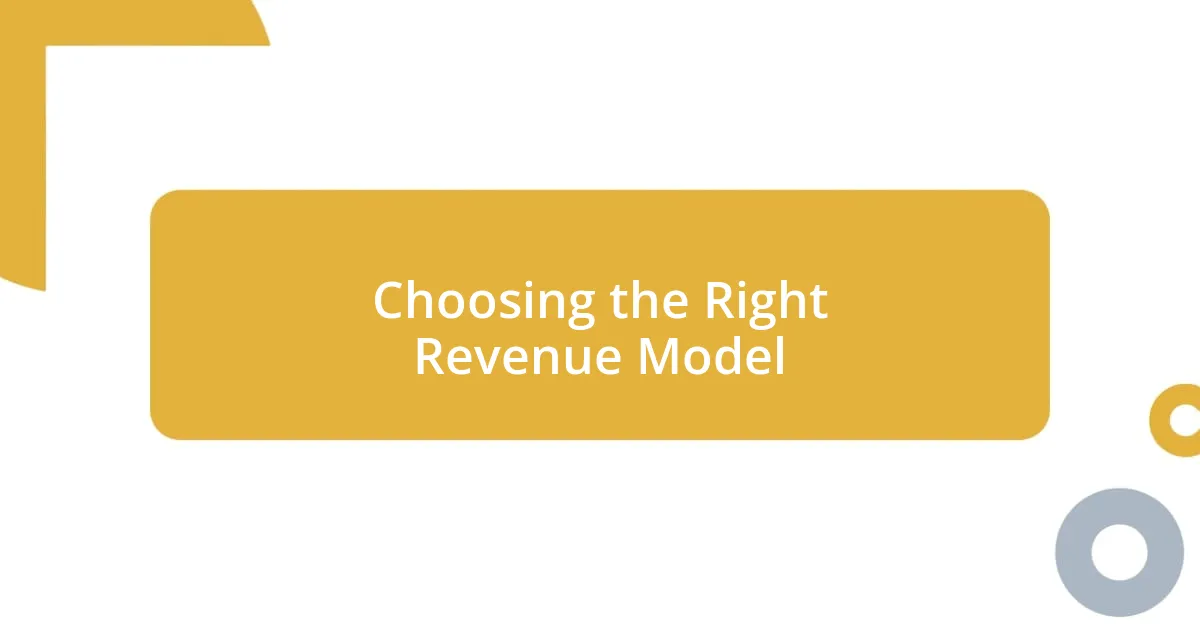
Choosing the Right Revenue Model
Choosing the right revenue model for your podcast is like picking the ideal ingredients for a recipe. It requires a blend of your strengths, your audience’s preferences, and the specific niche you cater to. I once jumped into a high-stakes sponsorship deal that seemed lucrative but ended up misaligning with my show’s tone. It was a valuable lesson that taught me the importance of authenticity in selecting revenue streams that truly resonate with both me and my listeners.
Here are some models you might consider:
- Sponsorships: Partner with brands that align with your content, ensuring they appeal to your audience’s values.
- Listener Donations: Use platforms like Patreon to engage listeners and offer them exclusive content or perks as a return for their support.
- Affiliate Marketing: Promote products you genuinely believe in, allowing your listeners to benefit from discounts while you earn a commission.
- Merchandising: Create branded merchandise that not only generates income but also builds community and connection with your audience.
Reflecting on the choices I made, I found that combining these methods allowed me to diversify my income without sacrificing authenticity. Balancing creative passion with savvy financial decisions creates a more fulfilling and stable podcasting journey.
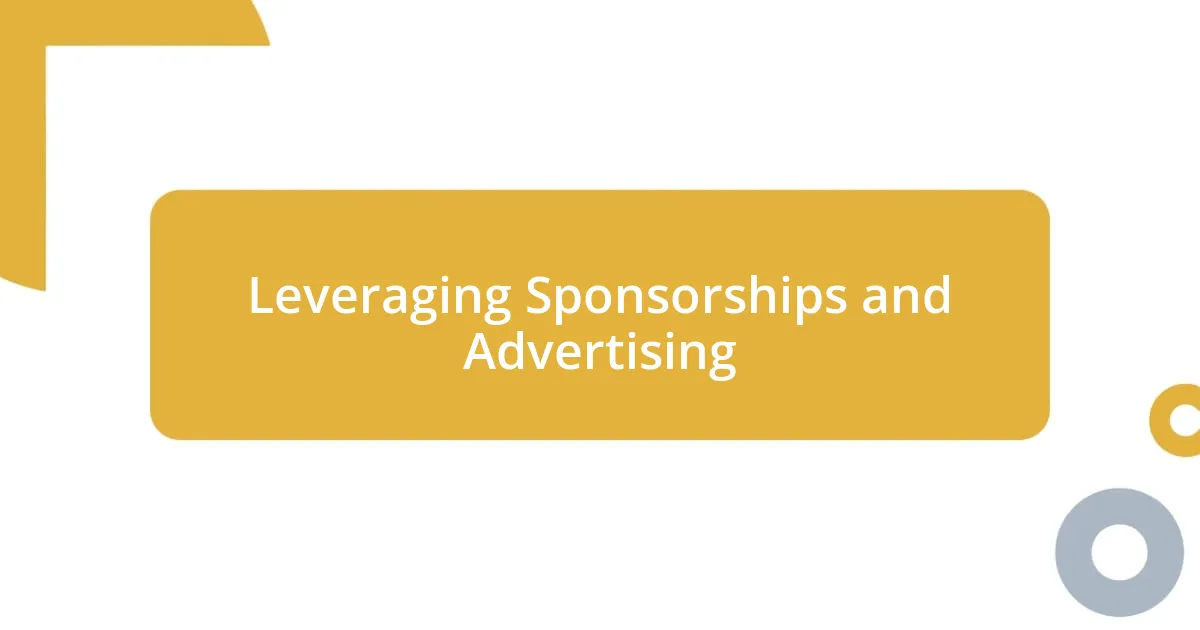
Leveraging Sponsorships and Advertising
When I first explored sponsorships, I felt a mix of excitement and apprehension. Partnering with brands that matched my podcast’s vibe just felt right, but I worried about crossing the line into being overly promotional. I learned that a genuine connection with sponsors can actually enhance my credibility; for instance, when I highlighted a sustainable product I used daily, my listeners responded with enthusiasm. This alignment not only drew in quality sponsors but also fostered a supportive community eager to engage with the promoted brands.
It’s fascinating how strategic advertising can transform the listener experience. While crafting ad spots, I concentrated on storytelling rather than simple endorsements. One memorable moment was when a heartfelt mention of a local brand resonated with my audience so deeply that it sparked discussions and shares on social media. I’ve found that when advertising feels integrated into the episode’s narrative, it engenders a sense of authenticity rather than disruption. Have you ever noticed how seamlessly some ads fit into a podcast? That’s the magic of thoughtful integration.
Finally, I must emphasize the importance of nurturing long-term relationships with sponsors. After a few campaigns, I reached out to brands for feedback, and the conversations revealed invaluable insights. This not only improved my future pitches but also helped foster a sense of partnership. As I built these relationships, I felt a deep sense of fulfillment, knowing we were working together toward shared goals. Have you ever considered how these types of collaborations could elevate your podcasting experience?
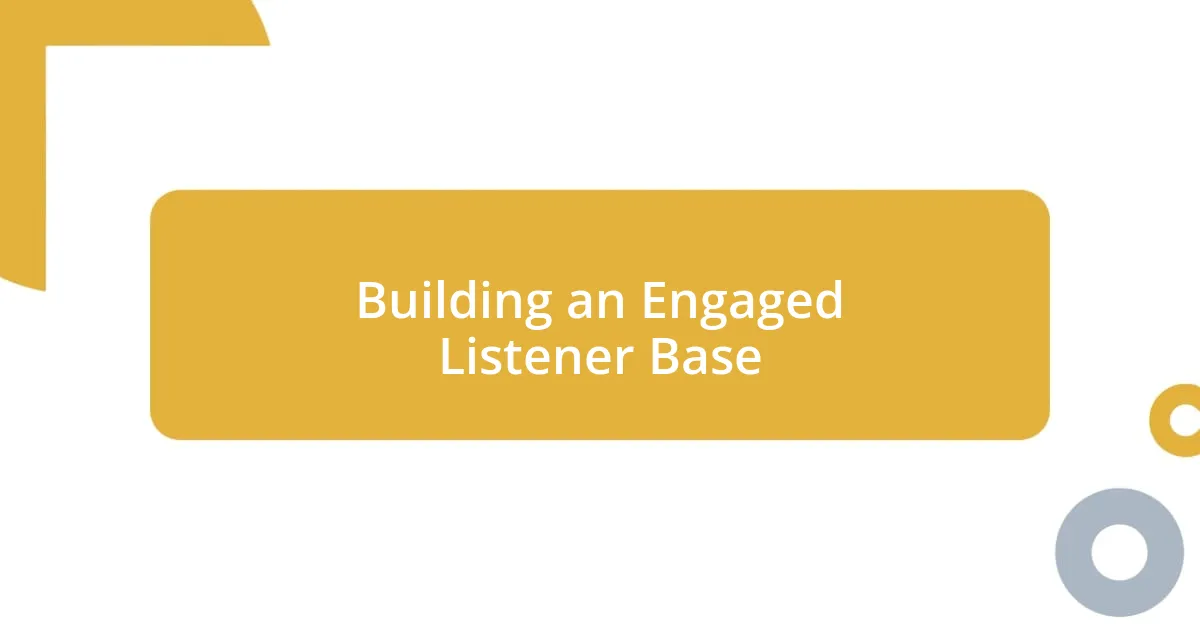
Building an Engaged Listener Base
To create an engaged listener base, I found that authenticity is key. Interactive elements, like Q&A sessions or live events, really drew my audience in. Once, after opening the floor to questions on social media, I was blown away by the depth of the engagement. It felt less like I was speaking to an audience and more like I was having a conversation with friends.
Another essential aspect is consistency. I remember a time when I took a break from posting new episodes – what a mistake! My listeners expressed their disappointment, reminding me how much they valued our weekly chats. I learned that showing up regularly not only builds trust but also keeps listeners invested in my journey, making them feel like they’re part of something bigger.
Lastly, I’ve realized that fostering a sense of community is invaluable. Creating online spaces for my listeners to connect enriched the experience. For example, I started a Facebook group where fans could share their thoughts on episodes and suggest topics. It was rewarding to see them engage with each other; it made my podcast feel more like a collaborative project than just a one-way conversation. Have you ever thought about how a community could amplify your podcast’s impact?
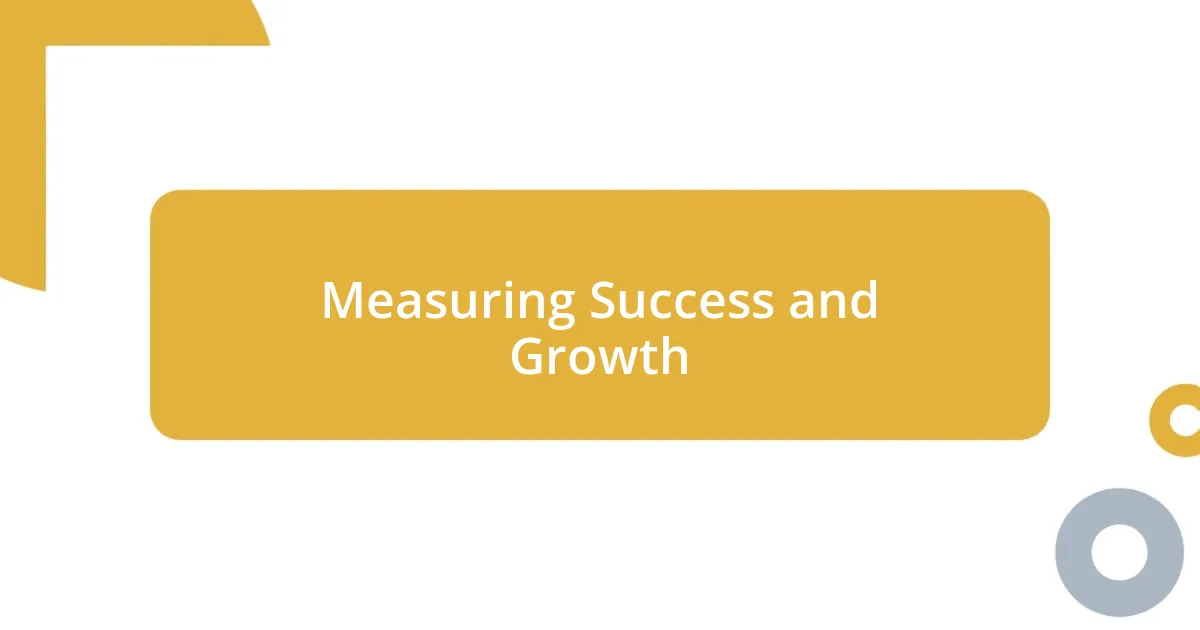
Measuring Success and Growth
Measuring success and growth in podcasting can be a bit tricky. I remember when I first started tracking metrics, like downloads and listener retention. Initially, I felt overwhelmed by the numbers, but over time, I learned that the stories behind those metrics matter more than just the figures themselves. For example, one month, I noticed a spike in listeners after implementing a specific marketing strategy — it felt incredible to realize that my efforts were resonating with an audience.
Another insight I’ve gained is the value of feedback. Early on, I started sending out surveys to my listeners to gauge their interest and preferences. One response I received really struck me: a listener shared how an episode inspired them to take action in their own life. That personal connection made me realize that success isn’t only about numbers; it’s about impact. Have you ever considered how audience feedback could provide meaningful insights into your growth?
Lastly, I’ve become more adept at setting specific goals over time, which has informed my understanding of growth. At first, I aimed only for more downloads, but now I focus on deeper engagement metrics, like social media interaction and audience feedback. One month, I set a goal to increase listener interaction by 20%, and actively shared behind-the-scenes content on social media. The next week, I saw more comments and shares than ever before. Reflecting on that experience makes me wonder: how are you measuring your podcast’s impact beyond the surface?
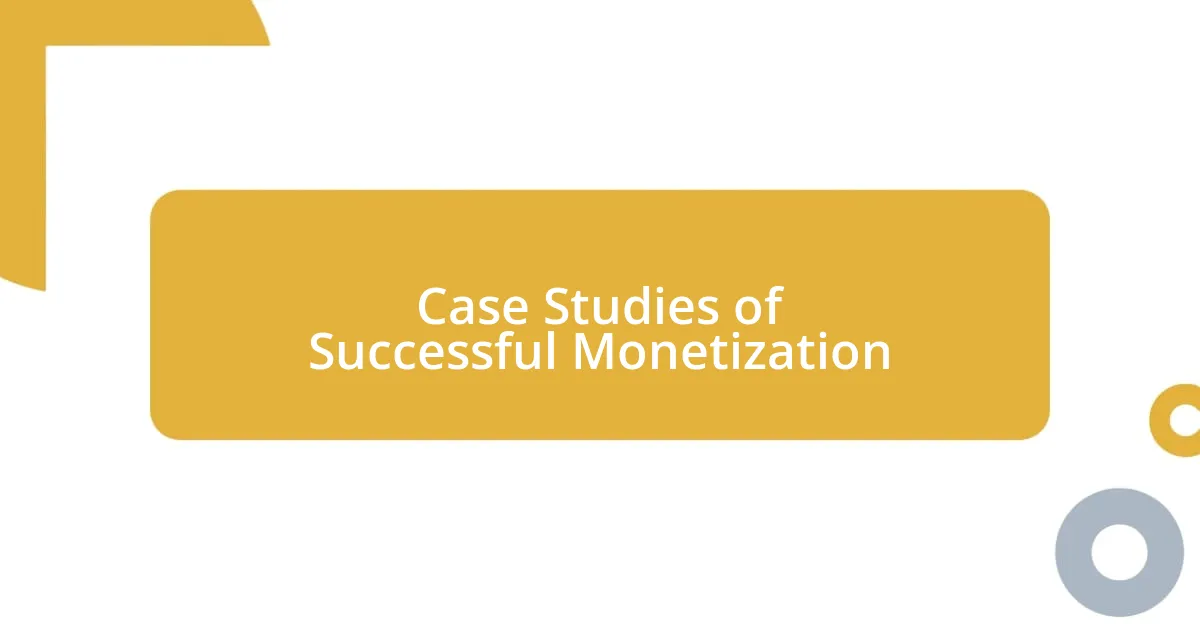
Case Studies of Successful Monetization
I’m excited to share some interesting case studies that highlight successful podcast monetization strategies. One example I admire is that of the “My Favorite Murder” podcast, which went from an independent project to a massive brand. Their success is largely rooted in their dedicated merchandise strategy. I’ve seen how their loyal fanbase eagerly purchases everything from T-shirts to mugs, turning casual listeners into passionate supporters. Have you thought about how tapping into your listeners’ enthusiasm for your content could lead to merchandise opportunities?
Another compelling case is “The Daily” by The New York Times. They transformed journalism into a compelling audio format that not only attracts millions of listeners but also drives subscriptions to their newspaper. I remember when they launched their subscription model, and I found it fascinating to see how an engaged audience willingly paid for valuable content. It made me think about the importance of providing unique value—what qualities in your podcast could encourage your audience to invest in a subscription?
Then there’s “How I Built This” with Guy Raz, demonstrating the power of sponsorships. This podcast not only connects with listeners through inspiring entrepreneurial stories but effectively attracts high-profile sponsors looking to reach a similar demographic. I’ve come to appreciate that aligning your podcast’s theme with relevant brands can amplify monetization efforts. Have you considered which brands would resonate with your audience and support your podcast’s growth?












